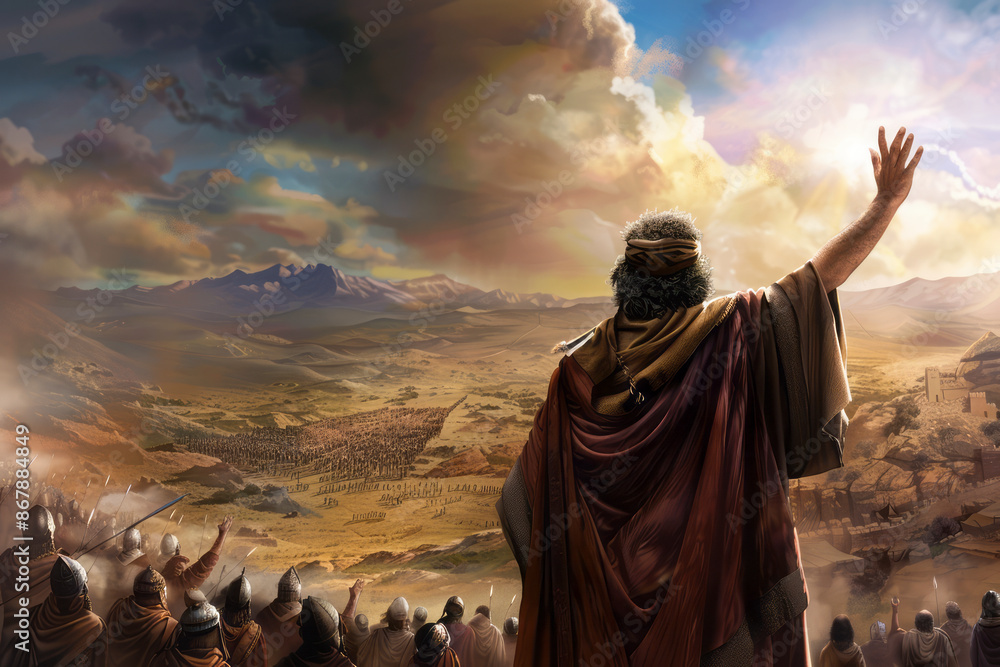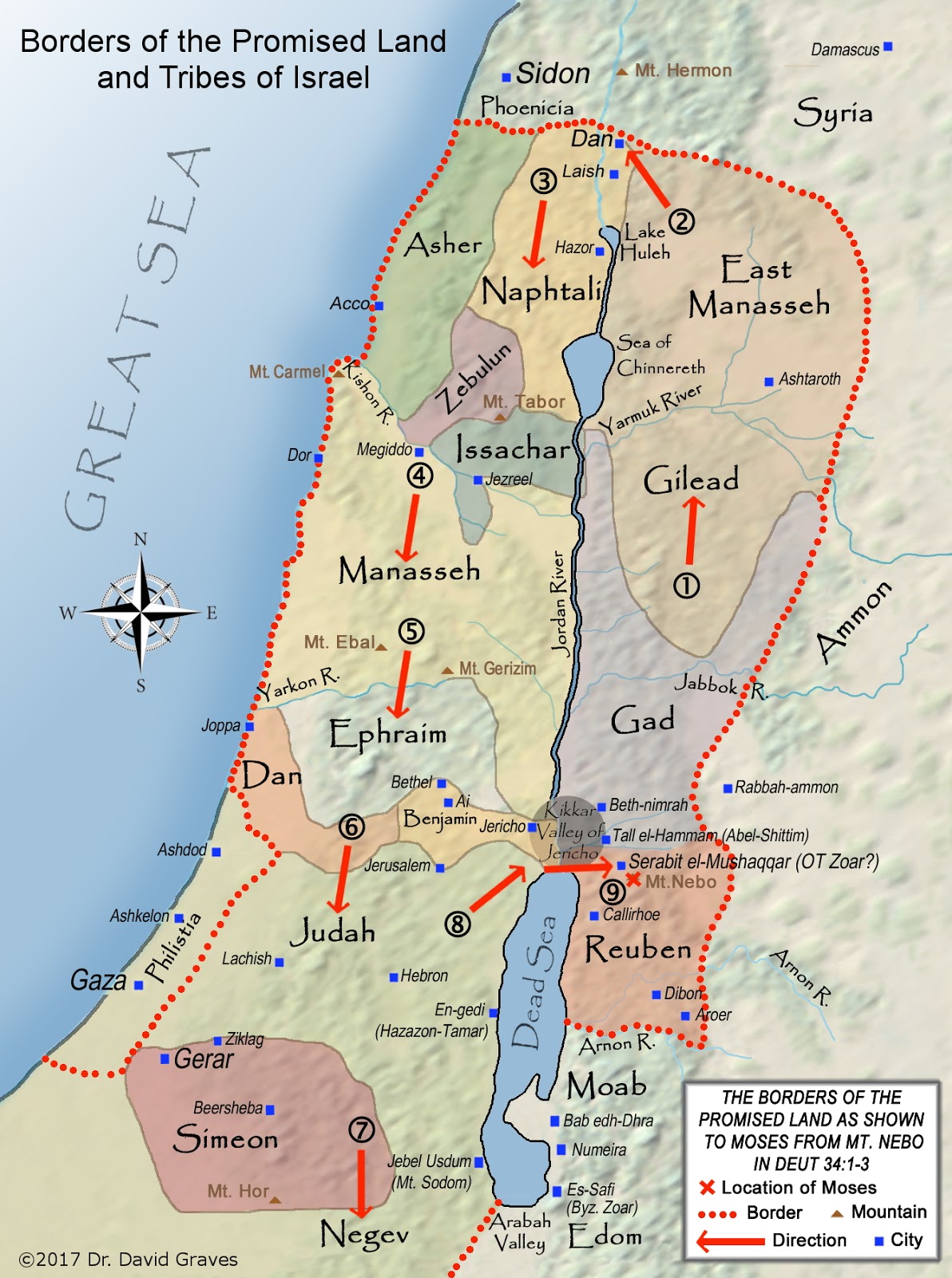Joshua

Growing in Christ
"He opened their minds so they could understand the Scriptures." Luke 24:45
Overview of Old Testament or New Testament
Links to observations drawn from other other books of the Bible
Practical and Pastoral Observations on the Book of Joshua (please read each chapter slowly and meditatively before reading observations below):
Introduction: Joshua, whose name means "Yahweh is salvation" is the name name as Jesus who is the salvation of Yahweh. The book is written largely as an eye-witness account by the author, Joshua himself (cf. chapter 24). Joshua recounts the conquest and division of the land promised to the children of Israel. The Ras Shamra Tablets describe the Canaanite religion as involving prostitution of both sexes, infant sacrifice and other corrupt and brutal practices which God wanted removed rather than be incorporated into the life of His people. This theme of avoiding syncretism is an important theme through the Scriptures as salvation comes from Yahweh alone.
Joshua 1
Succession Plan: Moses had laid hands of Joshua (Deut 34:9) and now the Lord called Joshua to step into his role with courage. Three times the call to be strong and courageous is given (v.6,7,9).
 God's
promises: include the broad boundaries of the promised land
(v.3-4), success and victory over those competing for the land (v.4, 6, 7,
8), and His unfailing presence throughout (v.4, 8).
God's
promises: include the broad boundaries of the promised land
(v.3-4), success and victory over those competing for the land (v.4, 6, 7,
8), and His unfailing presence throughout (v.4, 8).
God's conditions: be strong and courageous (v.7), keep the covenant given (v.7), meditate continually on the conditions of the covenant (aka the law v.8) in order to live it out.
Joshua Steps Up as Leader: Joshua notified the people of his plans to cross the Jordan (v.11) and called for their loyalty. Joshua called the 2 1/2 tribes (who Moses promised (see Num 32) could settle in land east of the Jordan) to keep their promise to help take all the land before returning to their land (v.12-15). The strong response of the 2 1/2 tribes (v.16-18) was critical to success of unified Israel. The 2 1/2 tribes promised to enforce the required discipline among their own ranks (v.18). All they asked of Joshua was the Lord's blessing on Joshua (v.17) and his unfailing courage (v.18)
What is required for the success of God's people? Unity, courage, full obedience to the Lord and the provisions of our relationship with Him and loyalty to the leadership appointed by God to the end of our task and calling.
Joshua 1:9: Have I not commanded you? Be strong and courageous. Do not be frightened, and do not be dismayed, for the LORD your God is with you wherever you go."
Personal Response: I will do what is required for the success of God's people and urge others to do the same.
My Prayer: Father, in our spiritual warfare against the
powers of darkness, encourage your people this day to learn and live as you
called the people of Israel standing before the Promised Land. May we
likewise be strengthened to meet the conditions of success you have laid
out.
Joshua 2
Second Spy Expedition: 40 years after Moses's 12 spies returned with a negative report which frightened the people (Num 13-14), Joshua sent 2 spies, secretly even from Israel, lest a discouraging report again dishearten Israel (v.1).
Rahab: Entering Jericho took great courage for the spies. Part of their strategy may have been the expectation that harlots ask fewer questions. Not surprisingly, the spies had already been seen and reported to the authorities (v.2). Their clothing or complexion may have given away the fact they were Israelites from Egypt (v.3). Rahab directed those searching for the spies to the road back to the Jordan were the spies had crossed, a logical supposition (v.7).
Rahab's Pragmatism born of Faith: The reputation of Yahweh, the God of Israel, had been known in Canaan since the crossing of the Red Sea and the overcoming of the Amorites (v.10). Rahab's conclusion was that Yahweh was greater than the gods of the Canaanites and would give the land to Israel (v.9). Whether a pragmatic conclusion or true faith, she acknowledged Yahweh as the God of heaven and earth (v.11).
Rahab's Covenant Proposal: Anticipating the possibility or more likely, the certainty of Jericho's destruction, Rahab proposed an transactional agreement: kindness for kindness (v.12), not only for her life but also those of her father's household. The spies agreed but added conditions: Rahab's father's household would have to be in one place (18-19) in the home marked by a scarlet cord in the window and Rahab would keep what she knew from her countrymen (v.20).
Escape: the spies hid themselves for three days in the hills (v.22) to the west of the city while those who pursued them went east to the Jordan (v.7).
God redeems all those who turn to him, including Rahab whose redemption placed her into the genealogy of the Redeemer (Matt. 1:5). The spies for their part were willing to bind themselves in a blood-covenant (v.19) to her.
Joshua 2:19: "Then if anyone goes out of the doors of your house into the street, his blood shall be on his own head, and we shall be guiltless. But if a hand is laid on anyone who is with you in the house, his blood shall be on our head."
Personal Response: I will make substantive agreements and hold myself to them, modelling for a faithless world what it means to be a man of my word even as God is always true to His Word.
My Prayer: Father, thank you for your covenant-faithfulness. Thank you that we can rely on you, giving us courage to be reliable in our relations with others. Lord, may this transformative trait be a model which spreads through all the earth!
Joshua 3
Three Days: The courage to which God called Joshua (1:1-9) was not only to be expressed in battle but in trusting God for the miraculous. A vast people of c.2 million people came to the Jordan's edge (v.1), where they rested for 3 days (v.2) while they received instructions (v.3-4) and consecrated themselves to the Lord (v.4) for "you have not passed this way before" (v.3) and "the Lord will do wonders among you" (v.4). God promised he would be with Joshua as he had been with Moses (v.7).
The Ark First: The presence of the Lord was carried about 1 km ahead the people (v.3). The Lord always goes before His people (v.6, 11).
Act of Faith in Response to Word of Promise: The priests carrying the Ark were to step into the Jordan and wait for the Lord to act (v.8). The Lord speaks (v.9) and His promise true. Just as surely as the waters of the Jordan will be cut off upstream (v.13), the people occupying the land beyond will be driven out of the promised land (v.10). Joshua said, “By this you will know that the living God is in your midst (v.10)
The Hand of God: The priests carrying the ark stepped into the water in faith and obedience. The Jordan (lit. the "descender") descends 1,000 feet between the Sea of Galilee and the Dead Sea through 27 rapids. At Jericho it is 50-60 yards wide. During harvest it normally overflowed its banks (v.15) with snow melt from Lebanon and became a torrent. Yet God caused some obstruction at Adam (v.16) about 30 miles north which dammed up and possibly diverted the water, leaving the Jordan river bottom exposed where Israel crossed on foot. The priests. holding the ark aloft, remained at the centre of the crossing point till all the people crossed, the Lord in their midst.
Old Testament "Types": Some students of the Bible highlight Old Testament "types" foreshadowing the New Testament. It was through Joshua ("Jehovah is salvation") that God opened the Jordan into the promised land, and through Jesus ("Jehovah is salvation") opened the way through death into heaven.
Personal Response: I will act in faith on the Word of God to me believing he will bring good. I will discern, through listening, sensitivity and practice, his voice, separating it from imagination, distraction and competitors.
My Prayer: Father, how mighty and purposeful are your deeds for the salvation of your people. Give me to hear, courage to obey and joy to see. Lord, be glorified above all in my heart and among your people.
In process...please come again...
